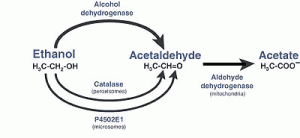Whether you drink alcohol or not, it has long been debated if alcohol has any positive effects on the body. Through reading a few articles I have noticed that alcohol can actually be beneficial to our bodies at a cellular level…believe it or not! In particular alcohol has shown to be beneficial when treating type 2 diabetes.
Type 2 diabetes is a disease characterized by the inability to uptake glucose in the cell, which results in high levels of glucose in the blood. In spite of this, it has been proven that alcohol can counteract this disability by causing an increase in proteins that allow for glucose levels to be lowered. Is it possible that alcohol consumption can be healthy for you and your body?
Light to moderate alcohol consumption has been shown to increase the concentration of high density lipoproteins in the body. High density lipoproteins are needed to remove cholesterol from the blood, however, they are in low numbers in type 2 diabetes patients. Studies have shown that an increase in high density lipoproteins correlates with a decrease in risk of type 2 diabetes. Therefore, it is vital for the well-being of a human to have high production of high density lipoproteins in his or her body to avoid being diagnosed with this disease.
Another important protein is the Glut4 protein, which is a facilitative transporter. This protein is responsible for the translocation of glucose in a cell and therefore contributes to the sensitivity of the insulin receptor. Consequently, type 2 diabetes patients have low levels of Glut4 and therefore have poor glucose regulation and have an increased resistance to insulin. It was found that alcohol stimulates glucose uptake in the muscle cells out of the blood and allows for the translocation of Glut4. With Glut4 active in the plasma membrane of the cells, the insulin receptors can work properly and therefore uptake glucose from the blood into the cell.

Life with diabetes by Bernard Farrell via Flickr Creative Commons
Alcohol consumption has, for the most part, been perceived with negative criticism in our society. However, when this is looked more closely at the cellular level, it may be a different story. In terms of type 2 diabetes, can alcohol really be considered a savior to those victimized or possibly prone to this form of diabetes? Possibly, in small and moderate amounts, alcohol can decrease the risk of this well-known disease with its ability to cause an increase in these important proteins. But in the end this is just one opinion of many, and ultimately countless hours of research and brainpower will continue to question the endless effects of alcohol on our bodies.
-Derek Rejto




